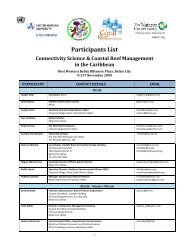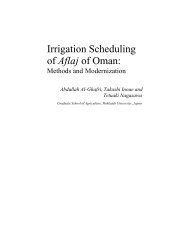The Global Water Crisis: Addressing an Urgent Security - Unu-inweh ...
The Global Water Crisis: Addressing an Urgent Security - Unu-inweh ...
The Global Water Crisis: Addressing an Urgent Security - Unu-inweh ...
You also want an ePaper? Increase the reach of your titles
YUMPU automatically turns print PDFs into web optimized ePapers that Google loves.
Jury <strong>an</strong>d Vaux project that the number of water-scarce countries could rise to 29 <strong>an</strong>d the number of water-stressed<br />
countries is <strong>an</strong>ticipated to rise to 19 by 2025. <strong>The</strong> combined population of these 48 countries is estimated to be 2.9 billion<br />
(Jury <strong>an</strong>d Vaux, 2007). In addition, economic development is likely to fuel increased dem<strong>an</strong>ds for water both directly,<br />
as in the growth in water-consuming industries, <strong>an</strong>d indirectly, in the form of dietary <strong>an</strong>d other lifestyle ch<strong>an</strong>ges which<br />
tend to be more water consumptive.<br />
A study of 92 developing countries (Vaux, 2012) shows that, as higher incomes drive improvements in diets around the<br />
world, as much as <strong>an</strong> additional 5,200 cubic kilometres may be needed <strong>an</strong>nually for agriculture alone by 2050. Growth<br />
of agricultural water dem<strong>an</strong>d of this magnitude will put enormous pressure on existing water supplies in m<strong>an</strong>y parts of<br />
the world, leaving little left to support natural ecosystem functioning or other essential ecosystem services. In short, the<br />
picture is almost inescapably one of growing dem<strong>an</strong>d matched against static or shrinking supplies.<br />
<strong>The</strong>re is some urgency in responding to this import<strong>an</strong>t global trend. It is now recognized that in order to provide water<br />
<strong>an</strong>d other benefits to people, nature needs water, too. <strong>Water</strong> allocated to the environment is critical in supporting the<br />
production of ecosystem services <strong>an</strong>d biodiversity. <strong>The</strong> failure to supply adequate water for environmental services could<br />
result in a decline in the capacity of the environment to provide food <strong>an</strong>d to support modern agricultural practices. <strong>The</strong><br />
continued reallocation of water away from environmental support towards agriculture <strong>an</strong>d other consumptive uses may<br />
in fact threaten the carrying capacity of the earth itself.<br />
Unfortunately, however, a full 40% of hum<strong>an</strong>ity is already competing directly with nature for water. As a result, we are<br />
beginning to see some frightening convergences (Safriel, 2011). If nature is to have the adequate amount of water it needs<br />
in order to provide import<strong>an</strong>t basic ecological services, then less water will be available for agriculture, which me<strong>an</strong>s<br />
that there will not be enough food for people. If, on the other h<strong>an</strong>d, priority for water allocation is given to agriculture<br />
in order to sustain growing populations, then there will not be enough water to allow nature to sustain its fundamental,<br />
long-term, pl<strong>an</strong>etary, life-supporting functions <strong>an</strong>d self-regulation.<br />
<strong>The</strong> resolution of such high stakes trade-offs <strong>an</strong>d the associated conflicts such choices will generate are likely to be very<br />
difficult to resolve peacefully, especially given that the dem<strong>an</strong>ds for water from other sectors <strong>an</strong>d for other uses is not<br />
likely to remain static (Vaux, 2012).<br />
<strong>Water</strong> quality <strong>an</strong>d qu<strong>an</strong>tity concerns will become international tr<strong>an</strong>sboundary political issues as the global agricultural<br />
sector tries to achieve the nearly impossible goal of doubling food production while at the same time reducing total water<br />
use by 10% by mid-century. <strong>The</strong> next wars may not be conflicts declared between sovereign states, but undeclared civil<br />
wars between cities <strong>an</strong>d surrounding agricultural regions over the timing <strong>an</strong>d extent of allocations.<br />
But water availability will not just affect food production. As has been pointed out elsewhere in this volume, water <strong>an</strong>d<br />
energy are also linked. <strong>The</strong> amount of water available to a given nation will determine its industrial capacity <strong>an</strong>d the<br />
quality of life that citizens enjoy as a result of nature receiving the water it needs to make places worth living. Prosperous<br />
countries in the future will be those that have enough water for food, cities, industry <strong>an</strong>d nature – <strong>an</strong>d that know how<br />
to ensure that each of these gets the amount of water that it needs (Solomon, 2010).<br />
Some observers, like Solomon (2010), have argued that a new world order is about to emerge out of the collision between<br />
population <strong>an</strong>d economic growth <strong>an</strong>d our pl<strong>an</strong>et’s rapidly ch<strong>an</strong>ging hydrology. Already, he claims, the divide is growing<br />
globally between those nations that have adequate water supplies to meet the current <strong>an</strong>d projected needs of their<br />
people <strong>an</strong>d the l<strong>an</strong>dscapes upon which they live, <strong>an</strong>d those that that are unable to meet these needs on a consistent basis.<br />
This explosive fault-line is likely to widen across the entire 21 st century political, social <strong>an</strong>d economic l<strong>an</strong>dscape. Tension<br />
between water ‘Haves’ <strong>an</strong>d ‘Have-Nots’ will grow between those who control upstream water flows <strong>an</strong>d downstream<br />
neighbours who do not receive all the water they need for industry <strong>an</strong>d cities. <strong>The</strong> gap will widen even more between<br />
nations that have sufficient water supplies to grow their own food <strong>an</strong>d support their growing populations, <strong>an</strong>d those who<br />
do not. As these gaps grow, we should expect greater tension over water in m<strong>an</strong>y parts of the world.<br />
Will the Next Wars Be Fought Over <strong>Water</strong>?<br />
Part 1<br />
13




